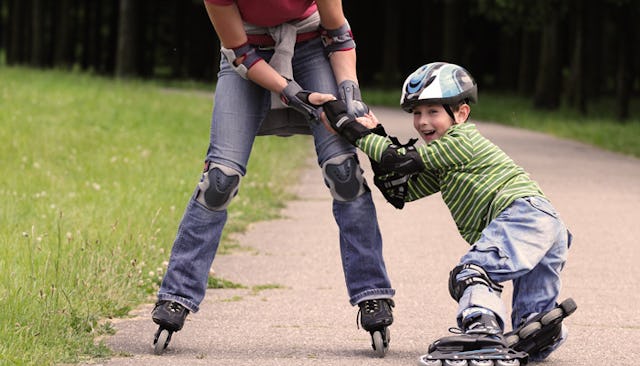How Much Should We 'Coddle' Our Kids?

I have a high school friend who has four daughters. This friend is the tough, hard-charging type: She played three varsity sports in college, refusing to sit on the bench even when seriously injured, studied her way into an Ivy League law school, took the bar while in labor, and now has a brutal career at a Big Fancy Firm. She doesn’t believe in giving in to pain. During playdates at our local park, I’ve seen her kids endure some wincingly bad injuries—the kind of head-hits-pavement blows where I would be examining the pupils and debating the ER. But no, she stands back, arms folded like a New England lacrosse coach on a 35-degree day, and barks, “You’re fine. Shake it off.” Her kids push themselves up, whimpering (and sometimes bleeding), and limp back into the fray.
In contrast, I’m a big softie. I have two boys, and they cry a lot. They cry for ordinary reasons, like when they’ve hurt themselves, and they cry for totally unreasonable reasons: The toddler sobs because he has sand on his hands—in the sandbox. The 5-year-old cries because it’s time to put away the toys and come to dinner. I feel like I am wiping away tears all the time. I try to draw a line between “legitimate” reasons to cry, like injuries, and “illegitimate” reasons, like there is “too much avocado on the plate.” I’m fine with my son, when he takes a tumble on the playground, coming for a brief cuddle on the bench before he feels like diving back in. I’m not fine with him sobbing because his sweater is twisted.
By all measures, her daughters are “tougher” than my sons. They don’t cry, pretty much ever. At preschool drop-off, when all the other parents stayed for the first day or two to get their kids acclimated, my friend took off her daughter’s coat, kissed her goodbye and left. The little girl began playing alone, eyes dry. The other kids took days, if not weeks, to acclimate, sobbing all the while.
“To coddle or not to coddle” is a balancing act all parents have to manage. A story ran in The New York Times recently called “Dear Parent, If Your Child Left It At Home, Don’t Bring It In,” about how schools are increasingly asking parents not to “rescue” their kids when they forget their homework or equipment they need for school. If your child forgets his homework, well, too bad—he takes the bad grade and hopefully is more careful next time. In the Times story, that’s what happened: The child was motivated to make a list of things he needed to take in the morning, a happy outcome for all.
But this ignores the fact that some kids simply need more support than others. Our culture does tend to emphasize independence at a very early age. It says a lot that the media coverage of helicopter parenting vastly outweighs the reporting on kids and families who are in dire straights and need more support.
I tend to think, as Catherine Newman wrote, that emphasizing “interdependence” is more a value I’d like to instill in my kids. She writes: “I’m thinking about the pound of flour I spilled on the floor recently, of [her son] rushing in with a broom and his good nature. I picture him saying, instead, ‘Maybe next time you’ll be more careful’ and cringe.”
Of course, part of our job as parents is to teach our kids to be self-sufficient, to remember their homework and to take responsibility for waking up on time and planning out their days. But what if there were gentler ways of doing this, over time, rather than refusing to comfort a child who’s hurt herself, or refusing to ever help out an overworked and overloaded child who’s forgotten her diorama for science? I fear that declining to offer help and comfort will dull their sympathy for other people who are struggling. After all, if those people had been more on the ball, they wouldn’t be in need of help. If they’re injured, they should shake it off.
My friend and I went to a high-pressure high school and similarly competitive colleges. For me, it was a huge relief to graduate and get out of that environment and to organize my life in a more laid-back way. My friend has continued with the high-achieving, no-pain-no-gain philosophy in her adult life and is obviously planning to instill those values in her girls. My boys will be more, well, coddled. There are a lot of different models for success and happiness in this world, and offering comfort and support is a value I want my boys to learn. I don’t want them to ignore their own—or anyone else’s—distress. I don’t want them to shake it off.
This article was originally published on